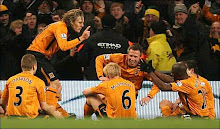Bramall Lane is not a favoured venue of the Tiger Nation if one looks solely at results. We haven't won there ... well, almost forever. Fans of slipper-wearing vintage will recall, eyes misting over, the infamous Battle of Bramall Lane back in 1971, a fixture renowned for its sporting ferocity as the Tigers came from a goal down to win 2-1, thanks to Chris Simpkin and Ken Wagstaff, and briefly go joint top of the Division Two table with promotion firmly in their sights. The significance of this win was immense, as it gave City fans genuine hope of elevation to the top flight, and also came three days after the demoralising and unjust FA Cup defeat against Stoke City which denied the Tigers a semi-final spot. The character of the team which Terry Neill had instilled came through superbly.
Most games at Bramall Lane since then have been, certainly by comparison but even without the 1971 fixture as a yardstick, something of an anti-climax. Sheffield United were the most regular Yorkshire-based opponents in the mad, bad days of the 1980s and frequently it would kick off more on the terraces than it ever did on the field. Recently, City have had two dramatic days at Bramall Lane, both of which ended in defeat when victory was either vital or expected.
In 2006, Peter Taylor's team - already safe from the drop and basking in the glory of a home win over Leeds United - were two goals down and out for the count when our sullen but skilled manager simultaneously threw on two substitutes. Immediately, one of them made it 2-1 when Stuart Elliott found himself free at the far post from Alton Thelwell's searching cross to fire in a simple shot and restore some hope, even turning his usual cartwheel of acknowledgement (if not quite celebration) as the players trotted back for the restart and hope was replenished.

Within five minutes, it was level and the pandemonium among the travelling fans exemplified why one goes to football matches. Stuart Green, playing the game of his life in midfield, found room to sneak a diagonal ball across the six yard box and Darryl Duffy, the other sub, glided it home and slid triumphantly on his knees before the Tiger Nation.
Taylor then complained about Sheffield United timewasting by picking up the fourth official's electronic substitute board and waving it about, endearing himself to the City fans in a way he rarely ever did. City were then denied a clear penalty when Green was hauled down by Paddy Kenny, then suffered the indignity of Kenny taking the rise out of the away support over the decision. This provoked some obvious rage among the Tiger Nation, rage which transmogrified into heartbreak when David Unsworth rifled in the winner from a half-cleared corner deep into injury time, prompting Kenny to take another gleeful look at the away fans, finger to lips. A 3-2 defeat, but with safety assured, it was one of those losses which was worth every penny shelled out.
The Blades were promoted that season, so the next trip came after their inevitable relegation a year later. Three games from the end of last season and automatic promotion was in our sights.

However, a combination of odd refereeing, toothless attacking and a makeshift defence which forced Phil Brown to pick political victim David Livermore as a centre back allowed Sheffield United as straightforward a 2-0 win as they will ever have, even after they were reduced to ten men. Still, as ignominious and deflating as it was, there was always the play-offs...
To go back to Bramall Lane for an FA Cup fifth round tie against a side now below us in the footballing pyramid is as mouth-watering a prospect as any winnable game the draw could have awarded us. The chairman wants to go back to Wembley, and maybe this sort of tie might just make the manager start thinking about it too.



.jpg)






